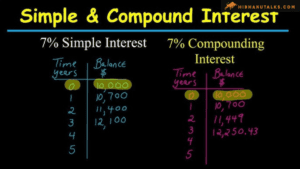
Retirement Planning Mistakes: Underestimating Compound Interest – How to Secure Your Future
Contents
- 1 Retirement Planning
- 1.1 Retirement Planning Mistakes: Underestimating Compound Interest – How to Secure Your Future
- 1.1.1 1.What Is Compound Interest?
- 1.1.2 2. Common Retirement Planning Mistakes Related to Compound Interest
- 1.1.3 3. The Power of Starting Early
- 1.1.4 4. Compounding Strategies for Retirement
- 1.1.5 Conclusion
- 1.1.6 FAQs:
- 1.1.6.1 1.Why is compound interest important for retirement planning?
- 1.1.6.2 2.What’s the difference between compound and simple interest?
- 1.1.6.3 3.How can I make the most of compound interest for retirement?
- 1.1.6.4 4.What happens if I start saving for retirement in my 40s?
- 1.1.6.5 5.Does compound interest work for all types of investments?
- 1.1.6.6 6.How does withdrawing funds early affect my retirement savings?
- 1.1.6.7 7.Can I rely on high-interest savings accounts for compound growth?
- 1.1.6.8 8.What if I can only contribute small amounts to my retirement savings?
- 1.1.6.9 9.How much difference does a 1% interest rate make in compounding?
- 1.1.6.10 10.How can salary raises help me maximize compound interest?
- 1.2 Retirement Planning
- 1.3 The Power of Compound Interest in Building Retirement Savings
- 1.1 Retirement Planning Mistakes: Underestimating Compound Interest – How to Secure Your Future
Retirement Planning
Retirement Planning Mistakes: Underestimating Compound Interest – How to Secure Your Future
1.What Is Compound Interest?
Compound interest is the interest earned on both the original principal and any accumulated interest from previous periods. Unlike simple interest, which is calculated solely on the initial investment, compound interest enables your money to grow exponentially over time. This means that the earlier you start saving, the more substantial your retirement fund can become.


2. Common Retirement Planning Mistakes Related to Compound Interest
a) Starting Too Late
One of the most frequent mistakes in retirement planning is waiting too long to start saving. Compound interest rewards time. The longer your money is invested, the more it can grow.
b) Neglecting Small, Regular Contributions
Some people mistakenly believe they need a large sum to start investing. In reality, consistent, small contributions can lead to impressive results over time. These smaller contributions build momentum, allowing compound interest to work its magic.
c) Relying on Short-Term Investments
Short-term investments often fail to capture the full power of compounding. While they may provide faster returns, they don’t allow compound interest enough time to show its exponential growth potential. This approach can hinder your retirement savings in the long run.
d) Underestimating the Effect of Interest Rates
Higher interest rates lead to greater compound growth. Choosing investment options with slightly higher returns can make a significant difference over time. People often overlook the impact a 1-2% difference in interest rate can have over 20-30 years.
e) Withdrawing Funds Early
Many people tap into their retirement savings during financial emergencies or other unexpected situations. While this may seem necessary at the time, it disrupts the compounding process, shrinking your retirement savings potential.
3. The Power of Starting Early
Starting your retirement savings in your 20s or early 30s can make a remarkable difference. Here’s a quick comparison:
- Person A starts saving $5,000 per year at age 25 and earns an average 7% annual return.
- Person B starts saving the same amount at age 35 but invests until retirement.
By retirement, Person A will have a significantly larger nest egg than Person B, despite only starting 10 years earlier. This is because Person A’s savings had more time to compound, resulting in exponential growth.


4. Compounding Strategies for Retirement
a) Invest in Long-Term Assets
Investing in assets with long-term growth potential, like stocks, bonds, or certain mutual funds, maximizes compounding. Consider diversifying your portfolio for stability and to capitalize on various growth opportunities over time.
b) Automate Contributions
Setting up automatic contributions to retirement accounts like IRAs or 401(k)s can help maintain a disciplined approach. Automating contributions ensures consistent growth, letting compound interest work effectively over the years.
c) Increase Contributions with Salary Raises
As your income increases, so should your retirement contributions. Even a 1-2% increase in your annual contributions can dramatically enhance your savings and accelerate compounding growth.

Conclusion
Underestimating compound interest is one of the most critical mistakes you can make in retirement planning. Starting early, investing consistently, and allowing your savings to grow without interruption can secure a stable, comfortable retirement. Compound interest is a powerful ally—when harnessed correctly, it can turn modest savings into substantial wealth over time. So, take advantage of compound growth today to set yourself up for a financially secure tomorrow.
FAQs:
1.Why is compound interest important for retirement planning?
A. Compound interest allows your savings to grow exponentially, helping you accumulate a larger retirement fund over time.
2.What’s the difference between compound and simple interest?
A. Compound interest earns on both the initial investment and accumulated interest, while simple interest is calculated only on the initial investment.
3.How can I make the most of compound interest for retirement?
A. Start saving early, make regular contributions, and let your investments grow long-term without withdrawals.
4.What happens if I start saving for retirement in my 40s?
A. While starting early is ideal, you can still benefit from compound interest by saving more and choosing higher-growth investments.
5.Does compound interest work for all types of investments?
A. Compound interest is most effective in investments with stable, long-term growth, such as retirement accounts, mutual funds, or bonds.
6.How does withdrawing funds early affect my retirement savings?
A. Withdrawing disrupts the compounding process, reducing the amount of interest your savings can earn.
7.Can I rely on high-interest savings accounts for compound growth?
A. While high-interest accounts offer some compounding, long-term investments like stocks or retirement accounts provide higher growth potential.
8.What if I can only contribute small amounts to my retirement savings?
A. Small, regular contributions can still grow substantially over time through compound interest, so consistency is key.
9.How much difference does a 1% interest rate make in compounding?
A. Even a 1% increase can significantly boost your savings over 20-30 years due to the exponential nature of compound interest.
10.How can salary raises help me maximize compound interest?
A. By increasing contributions as your salary rises, you can accelerate your savings growth and compound effect over time.
Retirement Planning
The Power of Compound Interest in Building Retirement Savings





















1 comment